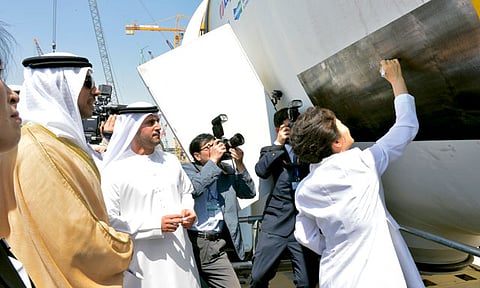Bilateral relations in robust condition
New collaborations in health care have boosted an already solid partnership between the UAE and South Korea, with two-way trade at $24 billion

Nuclear energy and electronics may get everyone’s attention, but ties between South Korea and the UAE, which go back more than 30 years, hinge on a variety of business sectors, including culture, education and health care where new agreements were signed last month.
Ahead of this month’s Korea Festival, which turns the spotlight on the Asian country’s food, cinema and theatre, Kwon Hae-Ryong, Ambassador of the Republic of Korea to the UAE, talked to GN Focus about the relationship between the two nations.
Two reciprocal high-level visits this year have further strengthened the partnership. Following a visit to Korea this February by General Shaikh Mohammad Bin Zayed Al Nahyan, Abu Dhabi Crown Prince and Deputy Supreme Commander of the UAE Armed Forces, Park Geun-hye, President of the Republic of Korea, visited the UAE in May. “The UAE was the first country for President Park to visit in the Middle East since the formation of the new government in 2013. This showed that President Park attaches great importance to our warm relationship,” says the ambassador.
The turning point in the partnership, which dates back to 1980, came in December 2009 when a consortium led by Korea Electric Power Corporation (Kepco) won a mega project to build four nuclear power plants in the UAE. At the same time, both countries agreed to upgrade their relations to a comprehensive strategic partnership. “Since then, the number of diplomats working in the embassy of the Republic of Korea has increased significantly to support and expand bilateral cooperation into many other areas including trade, energy, health care, education and culture,” Kwon says.
Trade on track
After reaching $25 billion (about Dh92 billion) in 2008, bilateral trade volume dropped to around $14.3 billion in 2009 in the wake of the financial crisis. It has since rebounded to $24 billion.
“An interesting fact about the trading relationship between the two countries is that it forms a complementary trading pattern,” says Kwon. Korea imports energy goods such as crude oil and LPG from the UAE, exporting manufactured goods such as cars, televisions and steel structures in return.
The UAE is Korea’s second-largest export market and trading partner. “Considering that the UAE is considered the hub for businesses in the Middle East and North Africa, I’m sure that the UAE will continue to have an important position in Korean international trade,” says the ambassador. “Of the Middle Eastern countries, UAE nationals visited Korea the most in the first quarter of this year. This rapidly growing number of visits will promote trade and investment between the two countries.”
More than 150 Korean companies now operate in the UAE. “Korean companies, famous for their advanced technologies, have contributed and will [continue to] contribute to the sustained growth of the UAE economy by playing a major role in many projects in the country,” says Kwon.
Medical collaborations
Health care is the newest area of focus. During a visit to the UAE last month by the Korean Minister of Health and Welfare, Moon Hyung-pyo, Abu Dhabi Health Authority said it would recognise Korean medical licences for doctors and nurses, without need for new exams, the Chosun Ilbo daily reported.
The decision is expected to apply across the UAE soon. Several Korean medical facilities already operate in the UAE and more are set to do so.
Also during the visit, Abu Dhabi’s VPS Healthcare said it is partnering with St Mary’s Hospital in Seoul to roll out state-of-the-art cancer diagnosis, treatment and research facilities across the UAE, with the first centre to open at Marina Mall, Abu Dhabi, by the end of the year.
Energy projects
Energy has been at the heart of the cooperation since the Emirates Nuclear Energy Corporation awarded the prime contract to a consortium led by Kepco to build and help operate four nuclear reactors at Barakah. “Barakah Nuclear Power Plant (BNPP) in Abu Dhabi is an exemplary case of a nuclear project around the world, which is progressing on time based on the firm trust between the UAE and Korea,” says Kwon. On her visit, President Park attended the ceremony for the installation of the Korean-built reactor vessel Barakah-1.
Last month, Daewoo Engineering & Construction Company, together with consortium partner Siemens, handed over the Shuweihat S3 power plant in Abu Dhabi. The plant will support increasing power demand from Abu Dhabi’s residents and industry.
Electronics
Automobiles and electronics remain the key drivers of bilateral trade. Business is growing for some. “We expect Kia’s pace of growth to continue in the second half of 2014 and we are very optimistic about the future business expansion in the region to reflect the global marketing strategy of Kia Motors Corporation,” says Mohammad Khader, President of Al Majid Motors-Kia UAE. Despite the competitive market, Kia Motors posted 20 per cent year-on-year sales growth in the UAE during the first half of 2014.
For Samsung Gulf Electronics, the UAE is one of its biggest selling markets in the Gulf, generating more than 50 per cent of its sales. “Our regional plans will be focused on maintaining these positions, while continuing to increase our market share across other product categories,” says Young Soo Kim, President of Samsung Gulf Electronics.
Koreans in the UAE
There has been a rapid increase in the number of Korean nationals living in the UAE — from 6,000 Koreans in 2010 to more than 12,000 this year. “Once the [nuclear] plants started the operation, more than 1,000 Korean professionals will stay in Barakah and this will not only be beneficial to the energy sector but also consolidate cultural exchange between the two countries,” Kwon says.



